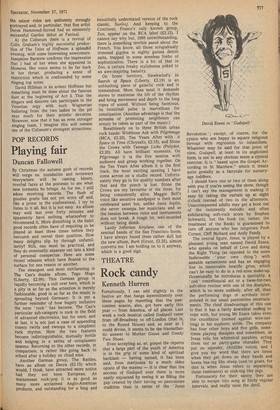THEATRE
Rock candy
Kenneth Hurren
Fortuitously, I can add slightly to the festive air that hangs intermittently over these pages by reporting that the pantomime season, also, got 'here early this year — 'from America, of all places. Last week a rock musical called Gods pelt came from off-Broadway to off-London (that is, to the Round House) and, as near as I could divine, it seems to be the transatlantic answer to Mother Goose and Goody Two Shoes.
Even accepting as, er, gospel the reports that a large part of the youth of America is in the grip of some kind of spiritual backlash — having turned, it has been said, from marijuana to a much older opiate of the masses — it is clear that the success of Godspell over there is more easily explained by seeing it as filling the gap created by their having no pantomime tradition than in terms of the 'Jesus Revolution ' ; except, of course, for the cynics who are happy to equate religious fervour with regression to infantilism. Whatever may be said for that point of view, Gods pelt, at ,least in its anglicised form, is not in any obvious sense a cynical exercise. It is "based upon the Gospel According to St Matthew," which it treats quite genially as a fairytale for nurseryage toddlers.
I should have one or two of them along with you if you're seeing the show, though I can't say the management is making it easy by taking the curtain up at eight o'clock instead of two in the afternoon. Unaccompanied adults may get a boot out of the 'insistently melodic and often exhilarating soft-rock score by Stephen Schwartz, but the book (or, rather, the treatment of the Book) is guaranteed to turn off anyone who has outgrown Pooh Corner, Cliff Richard and Andy Pandy.
The central figure, Jesus, is played by a pleasant young man named David Essex, who speaks on behalf of Love and doing the Right Thing (as opposed to the more fashionable 'your own thing ') with amiable earnestness and has an engaging line in immovable beatific grins, which can't be easy to do in a red-nose make-up. Occasionally he introduces a speciality, a ' cod ' ventriloquial act or a twee-for-two soft-shoe routine with one of the disciples, which is no more unlikely, after all, than the performing dogs or acrobats 'interpolated in our usual pantomime entertainments. The chief disadvantage of this one is that it has a fairly downbeat ending to cope with, but young Mr Essex takes even the crucifixion (mimed against wire-net ting) in his euphoric stride. The company has four other boys and five girls, some times playing disciples and sometimes, as Jesus tells his whimsical parables, acting them out as party-game charades. They put on squeaky, childlike voices, and I give you my word that there are times when they get down on their hands and knees baa-ing like sheep (and/or goats, for this is when Jesus refers to separating these ruminants) or oink-ing like pigs.
Fortunately for their sanity they are able to escape into song at fairly regular intervals, and really raise the devil.














































 Previous page
Previous page